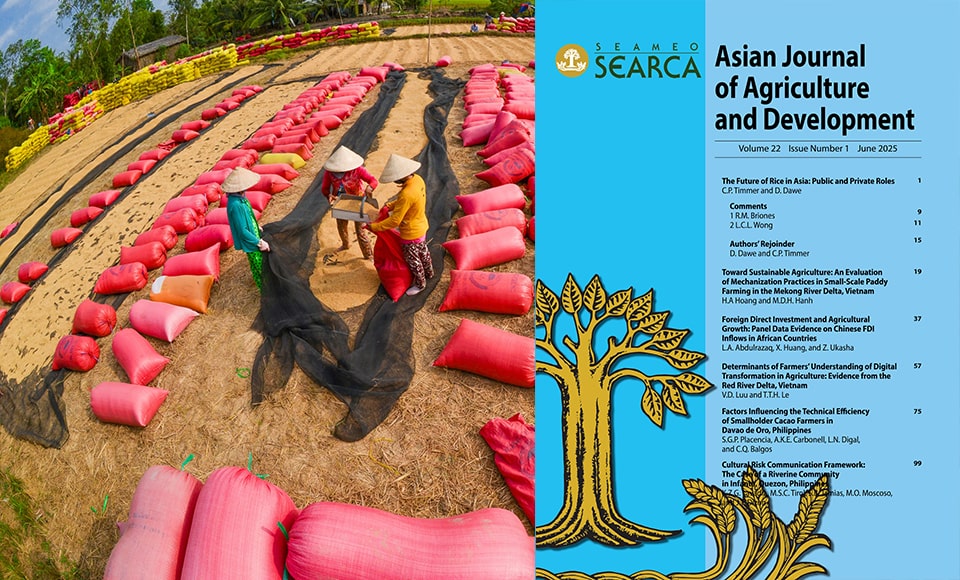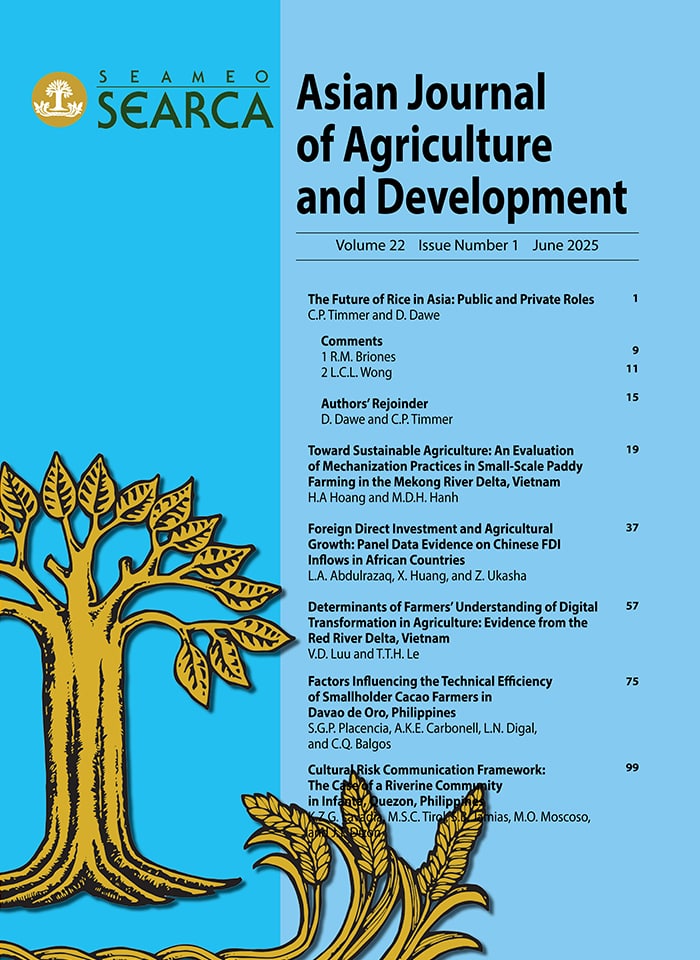The Southeast Asian Regional Center for Graduate Study and Research in Agriculture (SEARCA) spotlights urgent issues shaping the future of farming in its latest issue of the Asian Journal of Agriculture and Development (AJAD)—featuring new empirical studies and expert reflections that call for rethinking public and private roles in Asia's agricultural development.

The AJAD June 2025 issue's lead article, "The Future of Rice in Asia: Public and Private Roles," offers a comprehensive, experience-based reflection on Asia's rice economy, emphasizing that pro-poor growth remains the central objective underpinning the sector's future. Veteran policy analysts Dr. David Dawe, formerly of the International Rice Research Institute (IRRI) and the UN Food and Agriculture Organization (FAO), and Dr. C. Peter Timmer of Harvard University, underscore the evolving interplay between public and private roles across key domains—rice research, infrastructure, price stabilization, and structural transformation. They argue that navigating rapid changes in trade, technology, and institutions will require a careful balancing of policy, investment, and market-driven approaches.
Dr. Roehlano Briones of the Philippine Institute for Development Studies (PIDS) and Brain Trust Inc., another thought leader in rice policy, appreciates the depth and clarity of Dawe and Timmer's insights in his commentary. Nonetheless, he calls for a fuller exploration of critical themes such as value-adding structural transformation, the true nature of price stabilization mechanisms, and the looming challenges of climate change and resource scarcity. Dr. Briones suggests that these issues deserve more explicit attention to better guide future policy and industry adaptation in Asia's rapidly evolving rice sector.
Seasoned rice policy practitioner Dr. Larry C.Y. Wong, co-Founder of Myanmar Praxis Pte Ltd and Lannew Resources Sdn Bhd, also commends the authors for their clear and candid reflections on Asia's evolving rice economy, emphasizing the need to shift from a production-centric to a more holistic, demand-driven approach that integrates technology, trade, and policy innovations. Highlighting examples from Malaysia and Myanmar, Dr. Wong urges deeper exploration of private sector roles, countertrade, and border trade in shaping the future of rice in Asia amid rapid changes in digital technologies and geopolitical dynamics.
Dr. Dawe and Dr. Timmer responded to the insightful critiques by Dr. Briones and Dr. Wong, who each highlight important but distinct perspectives: Dr. Briones urges deeper analysis of structural transformation, price stabilization, and climate challenges, while Dr. Wong emphasizes practical insights from private sector innovations and evolving trade realities. Acknowledging the value of both views, the authors focus their reply on specific points raised and express strong support for a proposed regional research initiative on the future of rice in Asia.
 Meanwhile, the study "Toward Sustainable Agriculture: An Evaluation of Mechanization Practices in Small-Scale Paddy Farming in the Mekong River Delta, Vietnam" reveals high adoption in certain stages like land preparation and harvesting, but very low levels overall, particularly in transplanting, transportation, and modern machinery investment. Authored by Dr. Hoang Ha Anh and Dr. Tran Minh Da Hanh of Nong Lam University, Vietnam, the study concludes that current policies have failed to significantly boost mechanization and recommends targeted innovations—such as drone sprayers, self-propelled spreaders, and integrated transport systems—along with stronger training programs to address labor and technology gaps.
Meanwhile, the study "Toward Sustainable Agriculture: An Evaluation of Mechanization Practices in Small-Scale Paddy Farming in the Mekong River Delta, Vietnam" reveals high adoption in certain stages like land preparation and harvesting, but very low levels overall, particularly in transplanting, transportation, and modern machinery investment. Authored by Dr. Hoang Ha Anh and Dr. Tran Minh Da Hanh of Nong Lam University, Vietnam, the study concludes that current policies have failed to significantly boost mechanization and recommends targeted innovations—such as drone sprayers, self-propelled spreaders, and integrated transport systems—along with stronger training programs to address labor and technology gaps.
In the study "Foreign Direct Investment and Agricultural Growth: Panel Data Evidence on Chinese FDI Inflows in African Countries," Lawal Ademuyiwa Abdulrazaq and his co-authors from Fujian Agriculture and Forestry University, China, analyzed the long-term effects of Chinese foreign direct investment (CFDI) on agricultural value-added growth in 15 African countries from 2003 to 2021, using panel ARDL models and robust econometric testing. Results showed that CFDI significantly boosts agricultural growth, especially when coupled with rising employment in the agriculture sector, prompting recommendations for African policymakers to promote investment-friendly environments and explore country-specific FDI strategies in future research.
"Determinants of Farmers' Understanding of Digital Transformation in Agriculture: Evidence from the Red River Delta Vietnam" reveals generally low awareness and identifies six key determinants including education, internet skills, and exposure to training or pilot models. These findings of Luu Van Duy and Dr. Le Thi Thu Huong of Vietnam National University of Agriculture underscore the need for targeted government interventions such as localized training programs, practical demonstration sites, and support for scaling up agriculture to enable more effective digital adoption and sustainable development.
Shemaiah Gail P. Placencia and her co-authors from the University of the Philippines (UP) Mindanao in their study titled, "Factors Influencing the Technical Efficiency of Smallholder Cacao Farmers in Davao de Oro, Philippines," found significantly influencing factors such as education, farm experience, and income, while subsidies, extension services, and intercropping practices had a negative impact. The findings suggest a need to recalibrate existing government programs, enhance market linkages, strengthen education and training initiatives, and promote coordinated support across agencies to improve farm productivity, reduce inefficiencies, and sustain the cacao industry in the region.
The study "Cultural Risk Communication Framework: The Case of a Riverine Community in Infanta, Quezon, Philippines" by Kamla Zyra G. Lavadia and communication and development professors from the University of the Philippines Los Baños (UPLB) highlights how disaster risk is socially and culturally constructed, challenging the dominant scientific-technical perspectives. It reveals that residents of the riverine farming community studied primarily rely on local forecasting and socio-cultural cues rather than formal early warnings. The study recommends a cultural approach to disaster risk communication—one that integrates community worldviews, local communication channels, and participatory strategies. A hybrid framework that respects both scientific data and local knowledge systems is vital for building more effective, community-anchored disaster risk management policies.
The full AJAD volume 22 issue number 1 (June 2025) where the above articles are published is available for free from ajad.searca.org. More articles from past issues are archived and also available for download from the site, while print copies are available through subscription and from the SEARCA Knowledge Shop in Los Baños, Laguna.
AJAD publishes articles resulting from empirical, policy-oriented, or institutional development studies, as well as articles of perspectives on agriculture and development, political economy of rural development, and trade issues. Submissions are welcome all year-round through https://ajad.searca.org.
The editorial board is headed by Dr. Cielito F. Habito, former cabinet member of the Philippine government, having served as Socioeconomic Planning Secretary and Director General of then National Economic and Development Authority of the Philippines (now known as the Department of Economy, Planning, and Development). He also served as a professor of economics at the Ateneo de Manila University in the Philippines and Director of the Ateneo Center for Economic Research and Development.